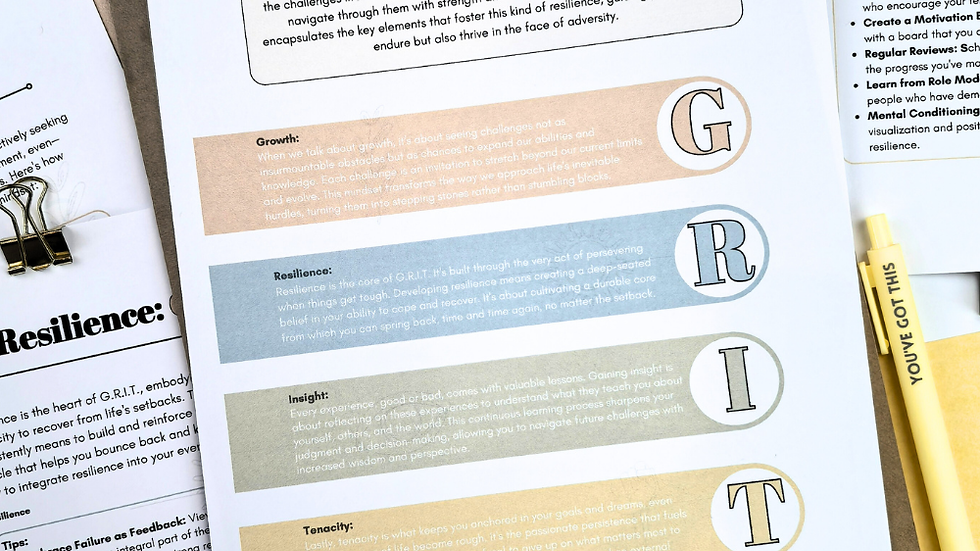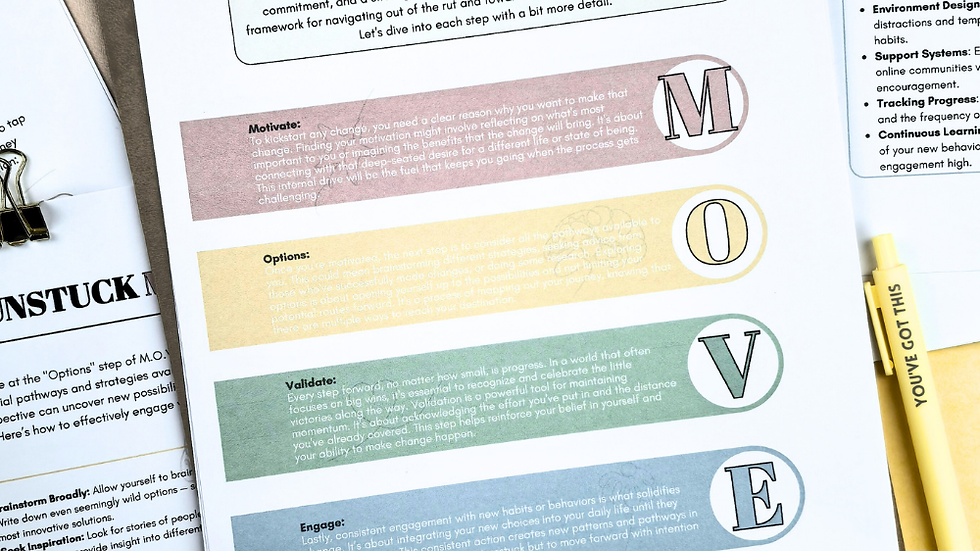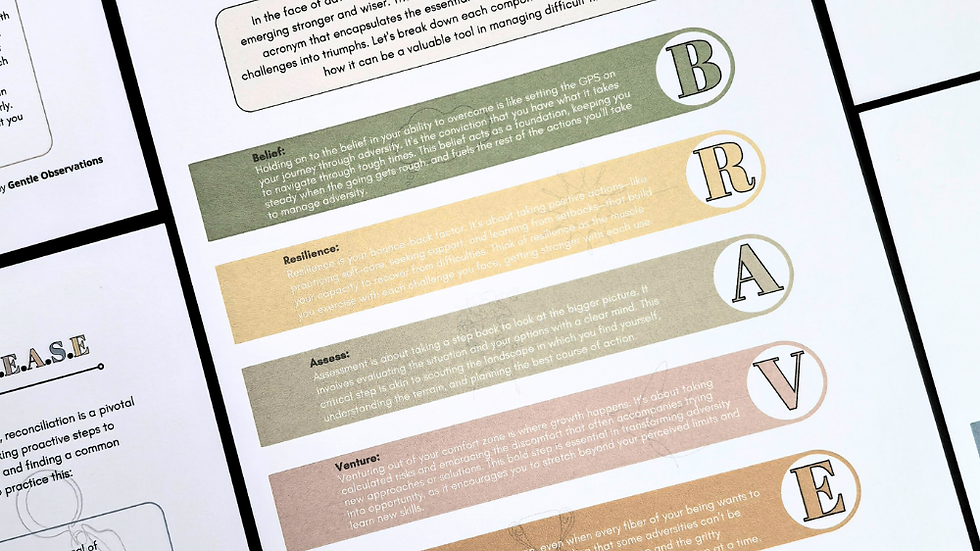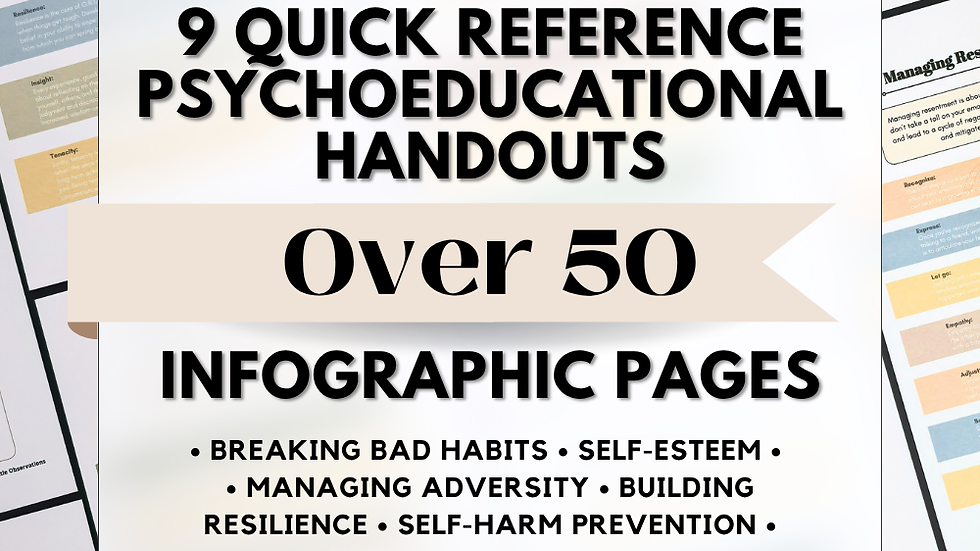9 Acronyms That Turn Therapy Skills Into Habits
- Monique McNamara
- Nov 2, 2025
- 5 min read
Updated: 4 days ago
Relationships & Communication, Teens & Adolescents (Ages 13-19), Adults (Ages 20+), Therapeutic Tools & ResourcesCommunication, Coping Skills, WorksheetsWhy Clients Forget Skills After Session: Understanding the Challenge
Have you ever noticed how clients can fully grasp a skill during a session, but when a stressful moment arises, it seems to vanish? They may nod along, practice the steps with you, and even feel confident leaving the room. Yet later, when they need the tool most, their mind goes blank.
This can be discouraging for both clients and therapists. It's not that clients are unwilling or incapable; rather, stress narrows the mind and pushes learned strategies to the background. What clients often need is a simple anchor—something they can hold onto in the moment without having to think too hard.
That is where acronyms come in. They work like mental sticky notes: easy to remember, easy to repeat, and easy to apply when emotions run high.
Let’s take a closer look at why acronyms are so effective, share some examples you can use in your sessions, and show how having handouts ready can make all the difference.

Why Acronyms Work in Therapy Sessions
Acronyms are more than just a teaching shortcut; they are a memory tool that makes coping strategies stick. When stress is high, the brain struggles to process long instructions or detailed steps. Acronyms cut through that overload by offering something simple and repeatable.
Here are a few reasons they work so well:
Reduce cognitive load: Acronyms shorten complex processes into manageable parts that can be remembered under pressure.
Age-flexible: They resonate with teens, adults, and groups, making them versatile across different settings.
Practical and portable: Clients can carry them in their minds like a small script, ready to use in daily life.
This is why many therapists rely on acronym-based strategies. They are quick to teach, easy to remember, and powerful in helping clients transfer skills from the therapy room into real moments of need.
9 Acronyms That Turn Skills Into Habits
G.R.I.T.: Building Resilience
Growth, Reflection, Intention, Tenacity. This acronym helps clients break resilience into practical steps.

Clients can reflect on past experiences, set clear intentions, and practice small acts of tenacity. It is a reminder that grit comes from consistent effort rather than innate toughness.
S.T.O.P.: Managing Impulses
Stop, Take a breath, Observe, Proceed.

This tool encourages clients to pause and create space between impulse and action. It works as a quick reset button, useful for those dealing with anxiety spikes, anger outbursts, or compulsive habits. With practice, S.T.O.P. can interrupt automatic reactions and replace them with mindful choices.
M.O.V.E.: Overcoming Procrastination
Mindset, Options, Visualize, Engage.

This acronym helps clients who feel paralyzed by procrastination or indecision. By adjusting their mindset, considering possible options, and visualizing outcomes, they can prepare to engage in meaningful action. It breaks “stuck” moments into doable, hopeful steps.
P.R.I.D.E.: Building Self-Esteem
Purpose, Respect, Identity, Determination, Empowerment.

This framework supports clients in building confidence by connecting them to values, identity, and purpose. Each step emphasizes respect for themselves and persistence in growth. P.R.I.D.E. reminds them that self-worth comes from embracing strengths rather than focusing on flaws.
R.E.S.O.L.V.E.: Healthier Conflict Resolution
Recognize, Express, Seek to understand, Open dialogue, Listen, Validate, Explore solutions.

This acronym guides clients to slow down their reactions, speak with awareness, and listen actively. It promotes healthier communication, reduces escalation, and offers a roadmap for navigating relational conflict with clarity and compassion.
B.R.A.V.E.: Facing Adversity with Strength
Balance, Resilience, Awareness, Values, Endurance.

This tool reminds clients that adversity is less overwhelming when they remain connected to values and balance. It encourages mindful awareness and persistence, framing courage as a skill that grows through practice rather than something people either have or don’t have.
S.A.F.E.: Promoting Safety and Reducing Self-Harm Risk
Stop, Assess, Find support, Engage in coping.

This acronym is a crisis tool that offers immediate direction when urges arise. It emphasizes safety first, encourages connection with others, and promotes using healthier coping strategies. S.A.F.E. gives clients a clear and reliable pathway to turn to in vulnerable moments.
R.E.L.E.A.S.E.: Releasing Resentment
Recognize, Express, Let go, Explore alternatives, Accept, Shift, Embrace freedom.

This framework walks clients through understanding and releasing resentment. It moves them from identifying and expressing the pain toward acceptance and freedom. R.E.L.E.A.S.E. provides both emotional validation and a path toward healthier letting go.
S.E.L.F.: Building Self-Awareness
Stop, Explore, Learn, Focus.

This tool encourages pausing, self-reflection, and clarity. It is simple yet powerful in helping clients notice patterns and make intentional choices. S.E.L.F. is a foundational skill that supports personal growth and relational awareness.
How to Use Acronym Handouts in Therapy
Acronym handouts are not just worksheets; they are versatile tools you can weave into many parts of your work.
Here are some ways to make the most of them:
Session anchors: Place them in front of clients during sessions as a visual reminder while practicing new skills.
Homework prompts: Encourage clients to keep a handout on their phone, mirror, or notebook so the acronym becomes part of their daily routine.
Group discussions: Use an acronym as a quick icebreaker or discussion starter to get group members reflecting and sharing.
Journaling guides: Invite clients to write about each step of the acronym, expanding it into a deeper reflection exercise.
Crisis supports: Some acronyms, like S.A.F.E., can be introduced as immediate steps to turn to in vulnerable moments.
By keeping these tools visible and accessible, you give clients practical ways to hold onto what they learn with you and carry it into everyday life.

Acronym Psychoeducational Handout Bundle
If you want all of these tools ready at your fingertips, the Acronym Psychoeducational Handout Bundle brings them together in one complete package. Instead of preparing acronyms on your own, you will have nine beautifully designed, print-ready handouts that are suitable for both individual and group sessions.
With the bundle you get:
All 9 acronym handouts (G.R.I.T., S.T.O.P., M.O.V.E., P.R.I.D.E., R.E.S.O.L.V.E., B.R.A.V.E., S.A.F.E., R.E.L.E.A.S.E., S.E.L.F.)
Print-ready formats in A4 and US Letter sizes
Therapist-friendly layouts that are easy to hand out in session or assign as homework
High-quality visuals that reinforce the steps clearly
Versatility across settings, making them equally useful in individual therapy, groups, classrooms, or coaching
This toolkit is especially helpful if you work across CBT, DBT, school counseling, or trauma-informed care, since the acronyms are flexible enough to fit different therapeutic styles.
CTA Options:
Add this bundle to your toolkit today and make coping strategies easier to remember.
Give your clients tools that truly stick by using these ready-to-go handouts.
Start using acronyms that clients can actually recall when it matters most.
Free Resource: 4 Steps to Getting Unstuck (M.O.V.E.)
If you want to try out one of these tools before diving into the full set, the 4 Steps to Getting Unstuck: M.O.V.E. handout is available as a free resource. It gives clients a structured way to shift their mindset, consider options, visualize outcomes, and engage in action.

You can use this free handout as a sample activity in session or as homework for clients who struggle with procrastination and avoidance. It is a small taste of how practical and easy these acronym-based tools can be.
Gentle Observation: Sometimes it is the simplest tools that leave the biggest impression. Acronyms may look small on paper, but in practice, they become something clients hold onto in moments of stress. I have often found that a short, memorable phrase is what a client recalls weeks later, even when longer lessons fade. These handouts are not just pages; they are anchors that support real change in daily life.
Jemma (Gentle Observations Team)
P.S. If you are a Therapy Resource Library member, you already have access to all nine acronym handouts inside your membership. Here are the direct links to each:
P.P.S. Not a member yet? You can join the Therapy Resource Library today and get instant access to this bundle along with hundreds of other ready-to-use resources. Learn more here.




















Comments